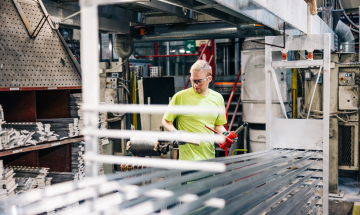
Technology industry demand shows no signs of recovery – divergence between companies increasing
This information is based on the recent order book and personnel survey as well as the corona pulse survey conducted by the Federation of Finnish Technology Industries.
According to the results, the situation in manufacturing has not improved notably during the summer, whereas in services (consulting engineering and information technology), the outlook is somewhat better.
“At the moment, it seems unlikely that the outlook for the rest of the year will become much brighter. Worst-case scenarios may not materialize if it would be possible to avoid the second wave of the coronavirus. Nevertheless, technology industries and the export sector in Finland are facing a difficult situation. A second wave of the epidemic is seeming more likely or its already begun, which poses a serious threat for the quick recovery of demand for exports,” says Petteri Rautaporras, Chief Economist at the Federation of Finnish Technology Industries.
As many as 85 per cent of technology industry companies report that weak demand is having a negative impact on their operations and 25 per cent report that it is causing significant difficulties. This is reflected in the number of requests for tender, which in July remained at the low level reached in the spring.
Order books shrank already in the spring
As expected, the weakened demand as a result of the coronavirus epidemic had a negative effect on the order books for the second quarter. The companies that took part in the Federation of Finnish Technology Industries’ survey of order books reported that the monetary value of new orders between April and June was 8 per cent lower than in the preceding quarter and 14 per cent lower than in the corresponding period of 2019.
Mechanical engineering, which is the largest technology industry sector, is facing a particularly difficult situation: the volume of new orders between April and May was 26 per cent lower than in the preceding quarter and 34 per cent lower than in the corresponding period in 2019.
At the end of June, the value of technology industry order books remained relatively unchanged from the end of March and 2 per cent lower than in June 2019. Shipyards contribute significantly to the total value of order books.
In terms of the overall situation, the drop in the orders of large companies is of special concern. Of the 30 technology industry companies with the largest order books, as many as 28 reported that the order books for their operations in Finland between April and June had contracted year-on-year. Furthermore, the drop in the monetary value of orders was also greater than the overall average drop for the technology industry. The effect of this drop is likely to trickle down to the subcontractor networks across Finland during the autumn.
A new support package is required, as well as digital and green transitions
According to the CEO of the Federation of Finnish Technology Industries, Jaakko Hirvola, the government should take urgent action to create a new support package to expand support to industry SMEs in Finland. The criteria of the support package introduced in early summer to help cover business costs is such that export companies, which have found themselves in the eye of the storm since, cannot get it. The application period of the support package will also end in August.
“Viable SMEs in the export sector cannot be left high and dry. If we do not support them, Finland has no hope of economic recovery or employment growth,” Hirvola emphasises.
The time to make decisions is now. If the government fails to invest in growth, nothing will change. Finland must be determined and switch to a fast lane with digital and green transitions.
“According to forecasts, Finland’s economy will be the slowest to recover in the eurozone, which means that employment-related decisions can no longer be postponed. Research and development are essential also because cost competitiveness is again deteriorating, and Finland can only survive by being better than others. At the same time, it is important to make sure that the investment programme supported by EU funding really will boost digitalization and helps fighting against climate change and that all EU countries use the financial support as agreed. It is especially important that Finnish companies can compete for the implementation of European recovery projects” Hirvola says.
Growing concern over cost competitiveness
According to forecasts, Finland’s cost competitiveness will weaken further in the coming years because of the coronavirus crisis. The wage formation system in Finland is inflexible, whereas in many competing countries wage formation is significantly more flexible during an economic crisis. The wage increases in the technology industry collective agreements are too high.
“Luckily, the technology industry agreements include the option to agree on salary increases also locally. Developments in the autumn will show whether this will be enough,” says Minna Helle, Director, Labour Market, at the Federation of Finnish Technology Industries.
Helle urges the government not to delay the necessary labour market changes to support employment. Finland needs to revamp the unemployment benefit system, promote agreements on a local level and introduce legislative changes to promote employment.
“We need to make these changes now to be ready to hit the ground running once the recovery starts,” Helle points out.
Further information:
Jaakko Hirvola, CEO, phone +358 40 063 3751
Minna Helle, Director, Labour Market, phone +358 40 341 4884
Petteri Rautaporras, Chief Economist, phone +358 40 304 2220



